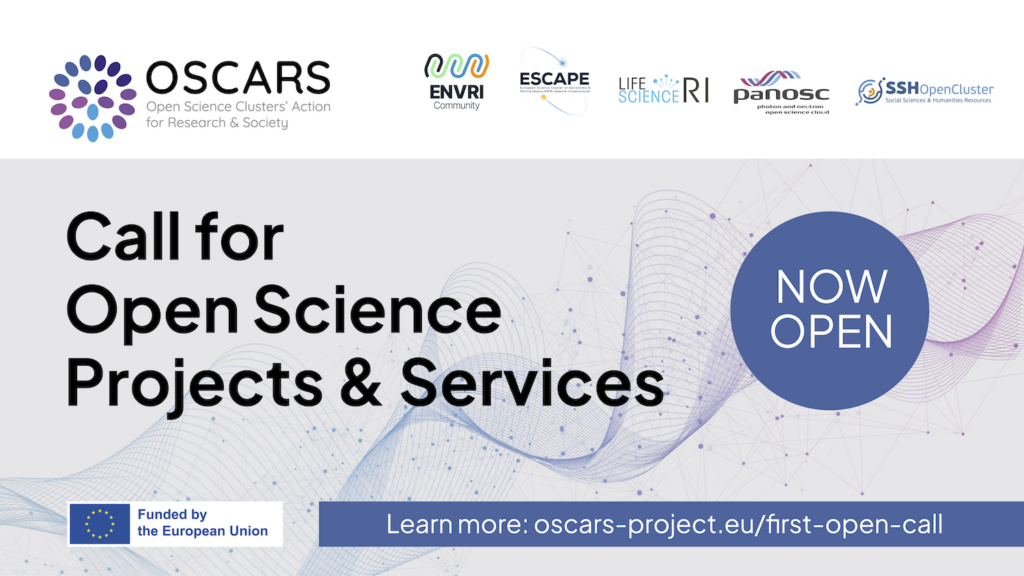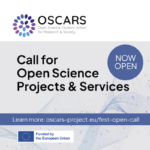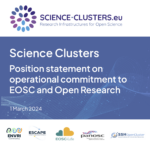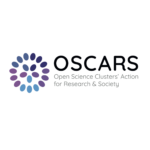OSCARS launches its 1st Open Call for Open Science projects and services

On March 15th, the Science Clusters launched the first OSCARS cascading-grant call for Open Science projects and services. Over 300 attendees across and beyond Europe joined the online launch event and had the opportunity to interact with the panelists via an open Q&A session.
As stated by OSCARS’ project coordinator, Giovanni Lamanna, “the aim of the Open Call is to support researchers in uptaking FAIR data analysis, provide a series of valuable scientific demonstrators of the role of the Science Clusters as thematic Nodes for ‘Open Research’ in Europe, and of the scientific impact of the European Open Science Cloud (EOSC)“.
The OSCARS project operates as a cluster of the Science Clusters – ENVRI (environmental science), ESCAPE (astronomy and particle-nuclear physics), Life Science RI (life sciences), PaNOSC (photon and neutron science) and SSHOC (social science and humanities), which bring together over seventy world-class research infrastructures (RIs) from the ESFRI roadmap and beyond to work on FAIR data management and connecting their user communities to the EOSC.
OSCARS Open Calls have a total worth of ~16 million EUR. Each selected proposal will be funded with a lump sum between 100,000 and 250,000 € and have to be implemented in a period between 12 and 24 months.
The scientific community at large is invited to apply to the 1st Open Call before May 14th, 2024. A second call is expected to be opened in November 2024.
Open Science Projects, or Open Science Services (such as software/middleware solution for data-access or data-management that, if applied to archived and already accessible data, makes their scientific exploitation FAIR and the achievable results open and more impactful), are research activities that exploit or foster the adoption of FAIR data, strengthen FAIR competences, practices and technologies.
They are expected to leverage and/or exploit the Science Clusters’ services aimed at demonstrating and piloting the use of EOSC resources. They can be cross-RI and/or cross-domain, as well as projects with a high societal relevance (potentially multidisciplinary and/or cross-cluster).
These projects can be proposed over a large spectrum of scientific domains, including industrial sectors. Therefore, they can be submitted by organisations/researchers beyond the current group of RIs that are partners within the Science Clusters, emerging RIs or recently included in the updated ESFRI Roadmap. They can involve engagement with academic groups and industry, University Associations/Learned Societies, citizen scientists and the long tail of science.
The Principal Investigators of these activities have to commit to the FAIR management of the achieved scientific results and all associated digital objects. A particular attention will be reserved for relevant datasets from RIs, the innovative software and services for interoperability and legacy of data. Projects must deposit the digital research data generated in the Science Clusters’ trusted catalogues or other trusted repositories federated in the EOSC. The projects should aim at enhancing the involvement of researchers in Open Science.
A multidisciplinary cross-cluster example involving two clusters, ENVRI and SSHOC, is the Climate-Neutral and Smart Cities project, in which an application has been prototyped, combining air quality data from the European Economic Area (EEA), climate data from Copernicus, and social data from the European Entry/Exit System (ESS).
In the ESCAPE Cluster for astronomy, nuclear and particle physics, the Dark Matter Test Science Project has provided new dark matter analyses, in which all digital objects have been implemented within the ESCAPE services infrastructure (Data Lake, Software Catalogue, Analysis Platform) used to store, distribute and provide data and software access to the broad dark matter scientific community.
Another example is the Open Science project implemented in the PaNOSC Cluster (photon and neutron science), the Human Organ Atlas project, which has made data from its database of human organs available as open data via a data portal, which supports searching according to the keywords and metadata of the data. In LS RI (Science Cluster for the life sciences), the project titled FAIR Phytolits project was implemented to increase the knowledge and use of the FAIR data principles in phytolith research towards the improvement of the communication of methods, data sharing and archiving practices within the discipline. As a result of the project, FAIR recommendations for the phytolith community to produce FAIR phytolith have been released, and training workshops took place on standardised vocabularies and FAIR data. The creation of a phytolith ontology is planned to aid interoperability of phytolith data, as well as the creation of an online open repository for phytolith data.
More Open Science projects’ examples
By funding selected Open Science projects and services, OSCARS responds to the need of enhancing researchers’ involvement in the EOSC, and of supporting research communities from any scientific domain to adopt Open Science practices.
Proposals will be evaluated by an Independent Evaluation Committee – IEC, composed of top scientists, experts in FAIR data science and representatives of the European research communities.
The IEC will first evaluate proposed scientific projects and service developments on the basis of their breakthrough character, scope and FAIRness, or “openness”, as well as their relevance to other RIs.
Following the evaluation within two months after the closure of the Call, selected projects will be granted starting with the signature of a TPPA – Third-Party Project Agreement.


